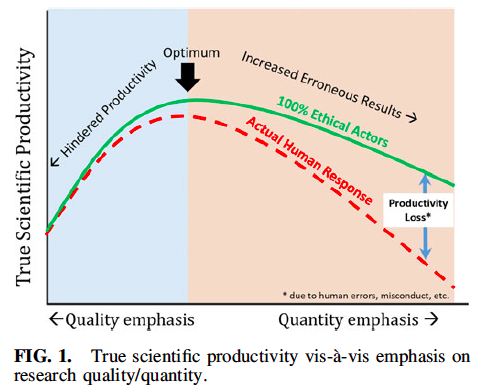Session 3: Management by metrics. Today& #39;s session starts with a reflective exercise. Consider the following contradiction. Reflect on your moral dilemmas, if any. https://twitter.com/DameLEGOVC/status/1198251413098422272?s=20">https://twitter.com/DameLEGOV... 1/11
Key reading is the HEPI report from @lizmorrish: https://www.hepi.ac.uk/wp-content/uploads/2019/05/HEPI-Pressure-Vessels-Occasional-Paper-20.pdf">https://www.hepi.ac.uk/wp-conten... P. 31-37 is an assessment of the university& #39;s "a concern with efficiency and effectiveness, internal and external accountability, performance indicators, benchmarking, targets & performance management." 2/11
Main message is how various external measurements of research capacity and teaching quality (which by themselves are problematics, more on this later) have now been "re-purposed as a tool of individual performance management" 3/11
"Metrics are being relied upon as proxies for quality, and any grant income is also assumed to reflect the value of the research (p. 34)" in spite of all the evidence that suggests juts how wrong this is: Journal impact factors are not credible ( https://www.timeshighereducation.com/news/journal-impact-factors-no-longer-credible)">https://www.timeshighereducation.com/news/jour... 4/11
Grant application is an exercise in futility ( https://alternative-democracy-research.org/2015/06/10/rationalizing-the-unreasonable-there-are-no-good-academics-in-the-eu/)">https://alternative-democracy-research.org/2015/06/1... Here& #39;s research https://journals.plos.org/plosone/article?id=10.1371/journal.pone.0118494">https://journals.plos.org/plosone/a... The survey found that the writing of 1 grant application takes 116 PI hours and 55 CI hours. 5/11
considering all other teaching/admin duties, that amounts to 8 weeks of PI time and 4 CI week. That& #39;s a commitment of 1 month full time effort! Success, however does not correlate with the amount of time spent on writing. Grant allocation is a lottery https://www.nature.com/articles/d41586-019-03572-7">https://www.nature.com/articles/... 6/11
How about measuring research quality through questionable internal/external reviews (REF). Problems: https://www.timeshighereducation.com/opinion/refs-star-system-leaves-black-hole-fairness">https://www.timeshighereducation.com/opinion/r... Here& #39;s a comment from the article “Well, a 4* paper is a 3* paper except that your mate is one of the REF panel members”. Discuss. 7/11
The result of working towards the measurable goals (and not to produce good research) are evident: Moore, S. et al. (2017). “Excellence R Us”: university research and the fetishisation of excellence. #affiliations">https://www.nature.com/articles/palcomms2016105 #affiliations">https://www.nature.com/articles/... 8/11
This shows that emphasis on quality/quantity has a negative effect on true scientific productivity. 9/11
OK. so what do we learn from this? We learn that "as soon as you try to measure how well people doing, they will try to switch to optimising for whatever you are measuring, rather than putting their best efforts into actually doing good work" https://svpow.com/2017/03/17/every-attempt-to-manage-academia-makes-it-worse/">https://svpow.com/2017/03/1... 10/11
Now, off to meet friends at the Teach Out by @MartinevanDriel https://docs.google.com/document/d/1ljX3HSFPjMVdTUKyFwFq6_3coA1sdq4H-PPgL-RPibI/edit">https://docs.google.com/document/... 11/11 #UCUstrikes

 Read on Twitter
Read on Twitter


